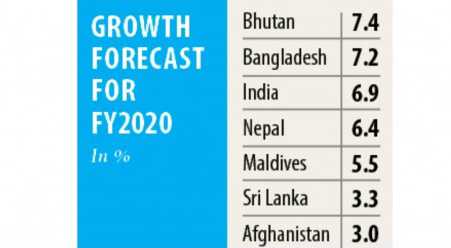Bangladesh to clock third highest growth

Image collected
The Bangladesh economy is tipped to clock in the third highest growth in the world in 2019 on the back of its robust exports, remittance and manufacturing sector, according to the International Monetary Fund’s latest report, which was a thumping endorsement of the country’s growth momentum.
The country’s GDP is projected to grow at 7.8 percent this calendar year, as per the IMF’s World Economic Outlook (WEO) report, which was unveiled yesterday here at the headquarters of the multilateral lender.
The latest projection for the Bangladesh economy is an upgrade from the earlier edition of the WEO that came out in April, where the growth was projected at 7.3 percent.
“Bangladesh is a good performer in terms of economic growth,” Gian Maria Milesi-Ferretti, deputy director of IMF’s research department, told The Daily Star during the launch of the report.
Global trade has been waning, so to manage more than 7 percent GDP growth in this condition is quite remarkable.
At the same time, the country has been improving the living standards of its population, he said, adding that political and policy challenges, however, remained.
Growth is expected to slow down to 7.4 percent in 2020 and 7.3 percent in 2024, said the report.
But this year, Bangladesh’s GDP growth will tie with Rwanda’s and will be bested only by Dominica and South Sudan, which are projected to grow at 9.4 percent and 7.9 percent respectively.
The IMF projected that Bangladesh will see less inflationary pressure this year. Inflation will be 5.5 percent this year, compared to last year’s 5.6 percent.
It also highlighted that the current account deficit has been rising in the last two consecutive years. The negative balance was 2.1 percent of GDP in 2017 and 2.8 percent in 2018. In 2019, the negative balance will narrow to 2 percent of the GDP.
Meanwhile, neighbouring India’s economy will grow at 6.1 percent, a downgrade from the IMF’s April projection of 7.3 percent. Among the other South Asian economies, Bhutan will grow at 5.5 percent, the Maldives 6.5 percent, Nepal 7.1 percent, Sri Lanka 2.7 percent and Pakistan 3.3 percent this year.
The global economy is in a synchronised slowdown, with growth for 2019 downgraded to 3 percent from the IMF’s April prediction of 3.3 percent -- the slowest pace since the global financial crisis.
The report said, “This subdued growth is a consequence of rising trade barriers; elevated uncertainty surrounding trade and geopolitics; idiosyncratic factors causing macroeconomic strain in several emerging market economies; and structural factors, such as low productivity growth and aging demographics in advanced economies.
“And yet, economies of Bangladesh, Cambodia, Nepal, Ethiopia, Rwanda, Dominica and South Sudan are projected to grow at 7 percent or more this calendar year.”
The report further added that “growth in low-income developing countries remains robust, though growth performance is more heterogenous within this group. Robust growth is expected for non-commodity exporters, such as Vietnam and Bangladesh, while the performance of commodity exporters, such as Nigeria, is projected to remain lacklustre.
“Downside risks to the outlook are elevated. Trade barriers and heightened geopolitical tensions, including Brexit-related risks, could further disrupt supply chains and hamper confidence, investment and growth.”
Global growth in 2020 is projected to improve modestly to 3.4 percent, a downward revision of 0.2 percent from the IMF’s April projections. Unlike the synchronised slowdown, however, this recovery is not broad-based and is precarious.
Source: https://www.thedailystar.net
Previous Story
- Evolution of the RMG sector
- Bangladesh 2nd fastest growing economy in South Asia:...
- World Bank forecasts 7.2 pct GDP growth for...
- Bangladesh second quickest developing economy in South Asia:...
- Growth lessons India can take from new frontrunner...
- By 2030, Bangladesh will be the 24th largest...
- Bangladesh eyes double-digit GDP growth in 5 years
- SME contribution still negligible: study